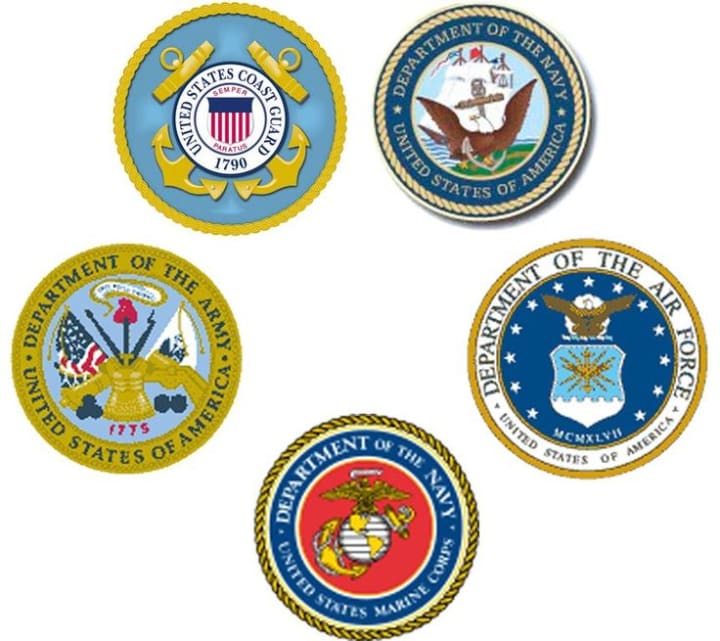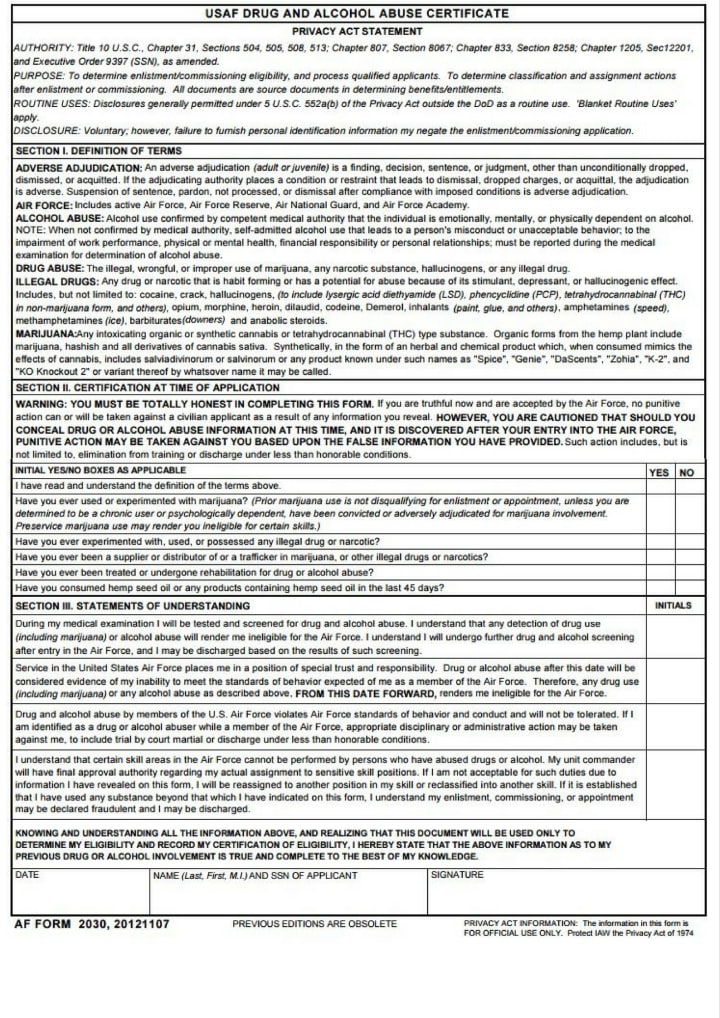Can You Join the Military If You've Smoked Marijuana?
Short answer: Yes…maybe. Depends on your number of high times...

Everybody knows that when you visit a military recruiter they are going to ask you some questions about your background. And they’ll definitely ask if you’ve used drugs.
What should you tell them? The truth, of course!
For one thing, truth is expected when you are signing up for military service and a career of—at least in principle—dignity, morality, and honor (there are always exceptions, especially when dealing with an organization which employs hundreds of thousands of personnel from around the nation. But by and large, servicemen and women are expected and do aspire to act with a high degree of dignity, morality, and honor…among several other distinguished traits!).
On a purely pragmatic tip, truth is also easier to remember…and you’re going to want to remember it because you’ll have to be consistent throughout your military career!
One lie early on can catch up to you down the road.
The issue at stake, however, is that because the military takes a hard stance against drug use, if you’ve dabbled with smoking weed or whatever then your past may prohibit you from ever stepping into a set of camouflage (except for Halloween).
The point of this article is NOT to tell you what to say to a recruiter or how to answer questions on a form.
Rather, the point is only to give you some pertinent information prior to ever setting foot in a recruiter’s office. It might help you make an informed decision before making the trip…

...unless you are a total burnout...
At the Recruiter's Office
Once you are there filling out paperwork and signing your John Hancock on the dotted line, whatever you choose to write on that initial recruitment form better be the same thing you write on every future form, in every future interview.
Because have no doubt, it IS going to come up again: for medical screening, security clearance vetting, or for specific career fields which rely on a higher-than-average level of competency!
How do I know?
Because during one of my own enlisted assignments, I aided in the recruitment procedures of hundreds of Air Force Reserve Officer Training Corps cadets.
(Big Brother, if you are watching... Don't worry, I’m NOT leaking any secrets here. Not even close. So stop looking at me; it's freaking me out!)
Everything here is publicly available information…even if it isn’t necessarily well-known!
At the AFROTC unit (or detachment as they are called) where I worked, the general rule during most of my tour there was, we don’t answer cadet questions about marijuana use when they are filling out the forms!
For example: if a ROTC (or enlistment) candidate has a blank recruitment form in front of them and the form asks “how you ever used marijuana?” they might want to know if it is automatically disqualifying to say YES.
Mainly all we could tell them was to just be honest.
Or they might want to know what is the “magic” number of disqualifying usage times. Is it 3? 10? Uh, what if I smoked so much I don't remember?
We weren't allowed to get into specifics with them (but if you smoked so much you can't remember, then yeah...).
Again, we only repeated to them, be honest.When they are sitting at the desk, that just isn’t the time to be answering such questions because it appears as if their answer might change based on the recruiter’s response.
Not supposed to work like that, for obvious reasons.
A candidate should be able to fill out those particular questions on the form without assistance; their responses, if truthful, should not require input or information from the recruiter.
However—that does not mean a candidate can't read up by themselves, in advance. Indeed the answers to many such questions are easily looked up from official sources within public domain.
Why are they in the public domain? I have no idea. Perhaps they should not be. But they are and have been for years and years! They are not hidden; they are not secret. They're just not typically well-known.
For instance, available online are several Air Force “Instructions,” which are official guides and regulations which workers reference during the course of their days in order to ensure compliance with military policies.
In other words, these “Instructions” tell the troop how to do their job. And many of these, including the ones pertaining to AFROTC, are freely accessible to the public!

What Are the Actual Written Policies?
Indeed some AFROTC detachments post these guides on their official websites, websites which are reviewed annually by Headquarters (HQ) AFROTC for compliance. So if HQ really didn't want the beans spilled, then these guides, these instructions, would be removed from the ROTC sites.
But they aren't!
Furthermore, all military instructions state on their front page where or not there are any “releasability” restrictions. The AFROTC Instructions list NONE, and even state plainly: “There are no releasability restrictions on this publication.”
See? So it's fine! We are NOT leaking anything here. Even Google Docs has a copy! So does Scribd...
(I don't mean to focus on Air Force, but that is what I know best. The other branches, I am sure, have very similar protocols since they all fall under the same Department of Defense...BUT, I "highly encourage" readers to find the applicable instructions for the branch they are interested in, rather than take anything for granted...)
Bear in mind, the military updates their regulations frequently and it can be hard to know if you’re looking at an old copy or not. Generally, if you want to be PARANOID about it, you can go directly to the source—in the Air Force’s case, that is their official publications library online: http://www.e-publishing.af.mil/ However, in this case it appears even the pubs library is carrying an outdated copy from 2006!
The instruction in question is AFROTC Instruction 36-2011 (the “36” designates it as pertaining to “Personnel”-related matters). The title is “Cadet Operations,” which is quite generic. However, a word search of the Adobe .pdf will dish up the results you need.
So there you go. Now let’s start reading that .pdf!
And remember, if the Air Force really didn’t want interested parties to have access to this information, then (some) detachments would not post AFROTCI 36-2011 on their websites...sites...sites! And…HQ AFROTC would not list AFROTC 36-2011 with zero releasability restrictions! And…AFROTC 36-2011 wouldn’t be publicly available to anyone via the main Air Force pubs library (even if that one is an old copy).
Just want to emphasize all that upfront (you see what they've done to me? I'm a nervous wreck!)...
The info within AFROTC 36-2011 is public domain and always has been!
The word search turns up 10 references for the word “marijuana.” The last 3 references are not really pertinent. Let’s see the ones that are relevant:
3.10.4.3.5. Detachments will use AFROTC Form 2030, Air Force ROTC Applicant Drug and Alcohol Abuse Certificate, to explain the Air Force policy on drug and alcohol abuse. Have the applicant complete the AF Form 2030.
By the way, that Form 2030 can also be found at http://www.e-publishing.af.mil/, or if you want a peek, I’ve got screenshots!
Emphasize to the applicant that any drug use (including marijuana) after the date of the interview is considered post-orientation and will render him/her ineligible for the Air Force.
3.10.4.3.5.1. If the applicant indicates previous use of marijuana, amphetamines, barbiturates, or non- prescription anabolic steroids, continue the interview. Have the applicant provide complete details by answering the questions listed on page 2 of the AF Form 2030. Ensure the applicant answers each question for each occurrence. For example, if the applicant says he used marijuana two times, then the applicant should answer the questions for each occurrence. Ensure the applicant and witness certification blocks are completed.
3.10.4.3.5.2. If the applicant has indicated use of other illegal drugs or narcotics, to include, but not limited to, cocaine, club drugs, crack, hallucinogens, and opiates, have the applicant complete the AFROTC Form 2030. Terminate the interview and inform the applicant that he/she is ineligible–waivers will not be considered. Forward the completed form to HQ AFROTC/RRUC.
The above poses the question—if the recruiter is instructed to terminate the interview due to the above-listed drugs, then why bother to have the candidate continue filling out the form?
Most likely it is because the recruiter will retain the form, in case that candidate goes across town to another recruiter. These guys have phones and they maintain databases, so naturally they are likely to share information… But hey, that is only my guess.

Form 2030...also publicly available online
Can I Get a Waiver If I Smoked Marijuana?
So you've smoked weed and you've admitted it to your recruiter. Now what? Now they "may" look at granting you a drug use waiver, so you can be admitted. Below are the general policies related to that, but as always, policies can change or be amended. This is the latest I could find... All bolding was done by me, to make it easier to read and focus on the key aspects.
4.7.5. Drug Use Waivers.
4.7.5.1. Waivers are permitted only for qualified applicants whose pre-application drug usage was limited in frequency and scope and unlikely to recur.
4.7.5.2. Detachment Commander Waivers. Detachment Commanders may waive use of marijuana provided no civil involvement other than possession and was limited in frequency as defined below.
4.7.5.2.1. Use limited to 5 times or less. Detachment Commander may waive use of marijuana or synthetic cannabinoids provided no civil involvement other than possession.
4.7.5.2.2. Use the applicant’s statement, along with a personal interview, to determine if the requirements are met. The Detachment Commander will sign and date statements. For AFROTC policy for HSSP recipients, see paragraph 4.8. Authorize program entry by annotating in the remarks section of the AF Form 2030 with the following statements:
4.7.5.2.2.1. “Pre-application limited experimental use of marijuana or synthetic cannabinoids unlikely to recur. I waive the use and grant program entry.”
4.7.5.2.2.2. “Member has been briefed and agrees to abide by Air Force policy regarding the prohibited use of illegal drugs. Program entry is authorized.”
4.7.5.3. The Detachment Commander may decide not to grant a waiver for substance abuse.
Note, just because a commander may have the authority to give a waiver doesn’t mean that they have to…nor are they required to tell you why, if they decide not to. Waivers are only offered for “qualified applicants,” and so this caveat alone gives commanders a broad brush to paint with. The recruiter is the first gatekeeper, and it’s their job to bring in folks. But again, they are limited in what they can confide to you.
In the end, the ROTC detachment commander, not the recruiter, is a prime local gatekeeper and that individual has quite a lot of decision-making authority when it comes to who gets in or not based on the recommendations of the recruiter and on whether the candidate is deemed “qualified” and worth the trouble to write a waiver for.
4.7.5.4. Waivers for drug use beyond the authority of Detachment Commanders may be submitted to AFROTC/RRF.
If the drug use listed by a candidate goes beyond what a det commander can waive, they do have another recourse. If the cadet is really very qualified, they may go through the effort to ask HQ AFROTC to grant a special waiver.
I’d say this is rare, especially if the recruiter is having a good season and isn’t worried about making “quota." Officer recruiters may not be given specific numbers to meet, but they are likely given a general goal for freshmen recruit numbers, and that goal will be relatively high due to the high washout rate. But they typically seem to get more than enough. So if you think you're going to need a waiver, it may behoove you to see the recruiter early, before the start of term, and before that rush of eager freshmen start signing up. In other words, get to the recruiter before he or she has reached their cozy target number.
Enlisted recruiters don't have a university calendar to work off of, however most likely they get a rush of enlistees following high school graduation...so the same concept applies. Go earlier than your peers if you think you'll need a waiver, because once the recruiter gets busy, they are likely less apt to spend time doing a waiver process for you. Not if they lots of easy catches who don't require the extra handling...
General waivers as mentioned above are not uncommon, but special waivers requiring HQ-approval are more time-consuming...and Headquarters, as one might expect, is a busy section. That said, the clause is there for a reason…
4.7.5.4.1. AFROTC/RR may consider granting a waiver for use of other drugs as outlined in AFI 36-2002, Regular Air Force and Special Category Accessions. Currently, use of amphetamines, barbiturates, or anabolic steroids may be waived. No other drugs (to include using someone else’s prescription) will be considered for a waiver.
4.7.5.4.2. HQ AFROTC/RRFP will not consider waiver requests for the illegal use or possession of more than one drug or grant waivers for manufacturing or distribution.
4.7.5.4.3. If an applicant indicated on their statement that they did not know the substance they were using was an illegal drug, the Detachment Commander may submit a waiver request to AFROTC/RRF even though the drug is not on the list of waiverable drugs. Be certain the applicant includes on the AF Form 2030 an explanation of why they did not know they were ingesting an illegal drug and what residual effects or flashbacks they have experienced. The intent of this paragraph is to consider a waiver for individuals who were unknowingly drugged by someone else. It is not intended to waive “I knew it was a drug, but I did not know which drug.”
4.7.5.4.4. Independent Evidence of Drug/Hemp Use. When evidence of an applicant’s/cadet’s drug/hemp usage is brought to the attention of the Detachment Commander by a third party, the Detachment Commander must contact Holm Center/JA for advice on the appropriate course of action based on assessment of evidence and allegations. After consulting with Holm Center/JA, the following actions apply:
4.7.5.4.4.1. Gather and verify available independent evidence.
4.7.5.4.4.2. The Detachment Commander will counsel the applicant/cadet via AFROTC Form 16 that evidence has been received of alleged drug/hemp usage.
4.7.5.4.4.3. The Detachment Commander will ask the applicant/cadet for an explanation. Document all comments.
4.7.5.4.4.4. If the applicant/cadet admits the alleged drug/hemp usage, dismiss (non-contract) or investigate for disenrollment. If the applicant/cadet denies the alleged drug/hemp usage, contact Holm Center/JA to evaluate the evidence for possible dismissal. Closely monitor retained cadets.
4.7.5.5. Drug Abuse or Use of Hemp Derivative after Orientation.
4.7.5.5.1. Cadets are not eligible for enlistment or commissioning if they use illegal drugs as defined in AFI 44-121, Alcohol and Drug Abuse Prevention and Treatment (ADAPT) Program, or use of hemp derivatives or synthetic cannabinoids (e.g. “Spice), following orientation to the Air Force Drug and Alcohol Abuse Policy as documented on the AF Form 2030. This is not waiverable. Prescription drug use without a prescription is also considered illegal drug use and will result in disenrollment.
4.7.5.5.2. Contract Cadets. Conduct a disenrollment investigation on a cadet who violates this policy. Initiate the investigation for failure to maintain military retention standards and ascertain all facts and circumstances pertaining to the violation. Do not request a waiver of the disenrollment process (reference Chapter 11,).
4.7.5.5.3. Non-contract Cadets: Drop or place in Special Student Status any cadet who violates this Air Force Policy. Counsel cadets via AFROTC Form 16 for failure to maintain military retention standards.
4.7.5.5.4. Following orientation, drug use brought to the attention of the Detachment Commander by a third party must be reviewed and a course of action assessed. Contact Holm Center/JA for guidance. 4.8. Drug Use and/or Alcohol Use/Abuse or New Civil Involvements Waivers for High School Scholarship Program (HSSP) Recipients.
As you can see above, whatever you did before signing up is done and over. It's in the past. But if they let you in, you'll get no more free passes. No waivers if you use drugs after you've signed up.
Other listings under our word search of AFROTC 36-2011 for “marijuana”:
4.8.1. Detachment Commanders cannot waive drug use or alcohol use, Category 4 or 5 civil involvements identifying alcohol or drug use or abuse on the AF Form 2030 and AFROTC Form 35 for HSSP recipients. These waivers must come to AFROTC/RRU for approval. The rationale is to ensure the scholarship was not obtained through fraudulent means by failing to identify drug use during the scholarship interview.
4.8.2. AFROTC policy is to withdraw the scholarship offer for students who failed to properly disclose civil involvements and for drug or alcohol abuse that occurred prior to the HSSP interview. These scholarships are considered obtained under fraudulent circumstances since the student failed to obtain a required waiver.
4.8.3. Drug use or alcohol abuse after the scholarship interview is considered “post orientation” since the AF Form 2030 is certified during the interview. IAW the AF Form 2030, Section III, Paragraph II, “any drug use (including marijuana) or any alcohol abuse as described above, FROM THIS DATE FORWARD, renders me ineligible for the Air Force”. Therefore, scholarship offer is withdrawn and applicant is not eligible for AFROTC.
As you can see, it can be financially devastating to a cadet who is given a scholarship but who failed to tell the truth on their initial drug use forms. This is yet one more reason to be honest on your form…and to ensure that you are consistent in your responses.
As this thorough article onThe Balancestates:
It's important that you be truthful with the recruiter. It's also very important that you not allow the recruiter to encourage, advise, or even hint that you lie about any of this important information. It is a felony to give false information or withhold required information on any military recruiting paperwork.
That's it! I'm out.
Hope this article was useful! It wasn't designed to be the end-all, be-all of articles, but just to give you one more piece of info, if you are thinking about signing up.
Speaking candidly with a military recruiter can be intimidating, especially when the subject of illegal drug use comes up. It's an uncomfortable position to be in! But at least knowing what to expect will help take some of the edge off when it is just you and them, sitting at the desk with a form and a pen in the middle between you.
The powers that be put all this info out in the public domain; so read it! My philosophy is, "Knowledge is Power." I just made that up...but really, there is no reason to walk into a recruiting office being totally ignorant of what's about to happen. You need to educate yourself first, and be prepared. Know what to expect, know what you want to say.
If you still have questions or concerns before going in, you can always make an anonymous phone call to a recruiter before going to see them! Or speak to friends or family members you trust, who have served in the military. No reason to do all this alone, after all (well, that's what I did; I didn't tell a soul, I just went and signed up...but I'm not that bright sometimes!).
The services may not be exactly "drug-friendly," nor should they be. But they are realistic. So like I said, if you've smoked marijuana, then it may still be possible to join up and serve your country in uniform. Maybe.
About the Creator
Matt Cates
Freelance writer and owner of Cates Content and Copywriting; retired Air Force Veteran; former administrative assistant at Oregon State University; author of Haveck: The First Transhuman, the greatest sci-fi novel in the multiverse.






Comments
There are no comments for this story
Be the first to respond and start the conversation.